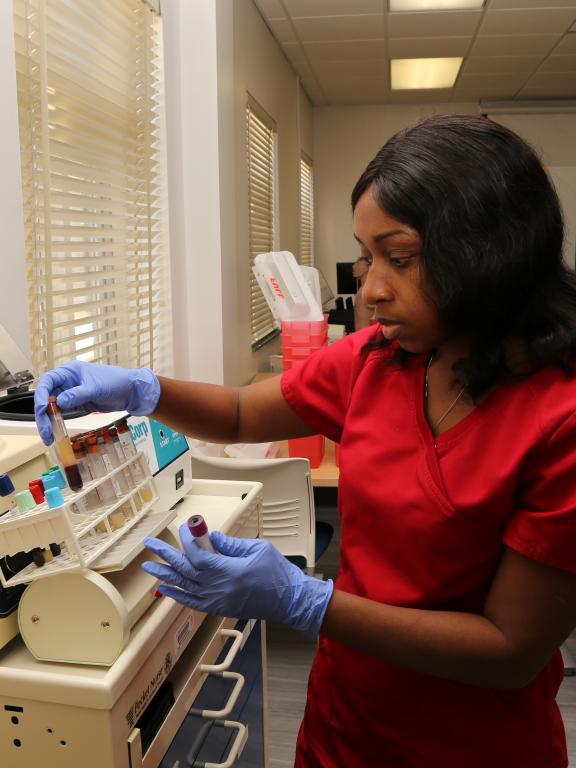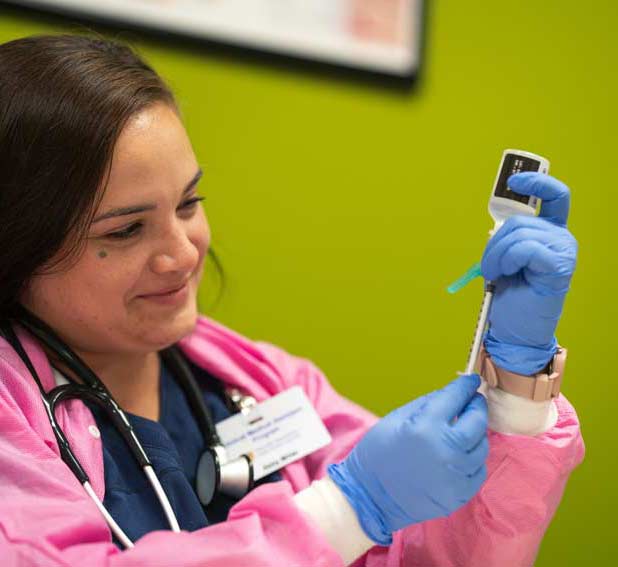Phlebotomy Classes Near Me: Career Impact Breakdown
Phlebotomy Classes Near Me: Career Impact Breakdown
Blog Article
Discovering the Vital Abilities Acquired From a Phlebotomy Training Course for Aspiring Professionals
In a phlebotomy training program, you'll gain important skills that surpass simply injuring. You'll master venipuncture techniques and learn the importance of safety and security methods. You'll additionally create the capability to interact properly with individuals, which can relieve their anxiety. But there's even more to it-- comprehending composition and handling research laboratory tools are simply the start. What various other important abilities can you expect to obtain as you prepare for a career in this field?
Recognizing Venipuncture Techniques
Understanding venipuncture methods is necessary for anybody going after a career in phlebotomy. You'll require to establish a strong grasp of how to situate capillaries efficiently. Start by exercising palpation abilities to feel for the appropriate areas, normally in the antecubital fossa - Phlebotomy Courses Near Me. It's all regarding being confident and mild while taking care of clients.
You must acquaint yourself with the various needle sizes and kinds, as choosing the right one can make a difference comfortably and performance. During the treatment, you'll find out to clean the site correctly to reduce infection risks.
Practicing the actual draw will assist you comprehend the value of angling the needle appropriately to access the vein without causing unneeded discomfort. By refining these abilities, you'll not only gain the depend on of your clients but also assure successful blood attracts, making you an efficient phlebotomist ready for the needs of the task.
Mastering Safety Procedures
As you best your venipuncture techniques, it's similarly important to focus on safety and security protocols to secure both on your own and your individuals. Familiarize yourself with infection control procedures, like proper hand hygiene and using personal protective tools (PPE) Constantly use gloves when dealing with blood examples, and alter them in between people to decrease contamination threat.
You need to additionally understand how to handle and throw away sharps safely. Use designated sharps containers and follow local standards for biohazard garbage disposal. Comprehending these protocols not just keeps you secure but likewise assures your individuals.
Furthermore, stay upgraded on emergency situation treatments, like what to do in instance of a needle stick injury or an unfavorable response (Phlebotomy Courses Near Me). Regular training and refreshers on safety protocols will improve your self-confidence and guarantee you're always prepared. By understanding these precaution, you add to a much safer healthcare atmosphere for every person involved
Establishing Client Interaction Skills
In phlebotomy, constructing relationship with individuals is essential for a favorable experience. You'll require effective interaction methods to help alleviate their worries and take care of any kind of stress and anxiety they may really feel. By focusing on these skills, you can create a much more comfortable environment for both you and your clients.
Structure Connection With Clients
Structure relationship with people is crucial for effective phlebotomy method. When you develop a connection, individuals really feel a lot more comfortable and at ease throughout treatments. By focusing on rapport, you not only improve the client experience yet also improve the accuracy of your job, guaranteeing that they're kicked back and participating throughout blood attracts.
Efficient Interaction Techniques
Effective communication techniques are necessary in phlebotomy, given that they aid you link with patients and assure a smoother experience. To create your patient interaction skills, focus on using clear and succinct language.
Usage non-verbal signs, like maintaining eye get in touch with and supplying a warm smile, to develop trust fund. Be compassionate and individual, particularly with those that might be nervous concerning the treatment. Tailor your interaction style to every individual, adapting to their level of understanding. Exercising these strategies will certainly enhance your capacity to engage with individuals properly and create a favorable ambience throughout their visits.
Handling Patient Anxiousness
While it's all-natural for people to feel anxious regarding blood draws, you can play a vital duty in easing their anxieties. You can additionally supply diversions, like speaking regarding light subjects or giving an anxiety sphere to capture. Warranty they're comfortable and supported throughout the process, as a positive communication can greatly decrease their anxiousness and foster depend on in your abilities as a phlebotomist.
Learning Composition and Physiology
Comprehending anatomy and physiology is crucial for grasping phlebotomy skills, as it assists you understand the body's framework and features. You'll learn more about the circulatory system, consisting of blood vessels, arteries, and blood vessels, which is crucial for locating blood vessels throughout blood draws. Acquainting on your own with the numerous types of blood cells and their functions will improve your capacity to describe procedures to clients and recognize test outcomes.
In addition, grasping the value of different physiological sites will certainly make you a lot more effective in identifying the most effective sites for venipuncture. You'll likewise check out just how the body reacts to injury and the healing process, which can notify your practice.
Taking Care Of Research Laboratory Equipment
Handling research laboratory tools is necessary for guaranteeing exact find this results and a risk-free functioning environment. You need to stay on top of maintenance techniques and comply with safety and security procedures to avoid mishaps. By prioritizing these methods, you'll enhance your efficiency as a phlebotomist and protect both on your own and your people.
Equipment Maintenance Techniques
Appropriate maintenance of research laboratory equipment is crucial for guaranteeing accurate test outcomes and the safety of both individuals and staff. To keep your equipment in leading form, start by cleaning it frequently. Clean down surface areas and elements to avoid contamination and wear. Look for any kind of indications of damage or malfunction, and address these issues quickly. Adjust your tools according to the supplier's standards to maintain accuracy. Furthermore, keep a log of maintenance activities and inspections to track performance in time. Establish all materials, like needles and tubes, are kept effectively to lengthen their life expectancy. By developing a routine for devices care, you'll enhance integrity and performance in your research laboratory techniques.
Security Procedures in Labs
While it is vital to maintain laboratory equipment, sticking to security methods is equally important to secure everybody in the laboratory. Always wear suitable individual safety tools (PPE), like handwear covers and goggles, to reduce direct exposure to dangerous materials. Acquaint yourself with the place of safety devices, such as eyewash terminals and fire extinguishers, guaranteeing they're obtainable. Appropriately label and shop all chemicals to avoid mishaps and mix-ups. When using sharp instruments, manage them meticulously and get rid of them in designated containers. Maintain your workspace organized to minimize the threat of spills or injuries. Consistently inspect tools for any signs of wear or breakdown, and record problems immediately. By adhering to these protocols, you contribute to a more secure setting for everyone entailed.
Executing Quality Control Measures
Applying top quality control actions is essential for ensuring the precision and reliability of phlebotomy methods. You require to routinely adjust and maintain your tools, as also small inconsistencies can lead to significant errors in outcomes.
Performing routine audits of your processes can highlight locations requiring improvement and enhance finest practices. You ought find out to likewise join ongoing training to remain updated on the current techniques and technologies in the field. Urging comments from colleagues can produce a culture of teamwork, where everyone is purchased keeping quality requirements. By focusing on high quality control, you not just enhance your own skills yet likewise add to better client outcomes and the total integrity of the health care system.
Browsing Legal and Ethical Factors To Consider
As you navigate the complicated landscape of phlebotomy, comprehending the lawful and moral factors to consider is important for your technique. You'll require to acquaint on your own with regulations relating to client authorization, discretion, and handling of biological products. Constantly make certain you have actually informed consent from people prior to doing any kind of treatments. This not only secures their legal rights but additionally develops trust.
Ethically, you ought to respect person personal privacy and maintain privacy in all times. Know the Medical insurance Transportability and Accountability Act (HIPAA) regulations, which control the handling of sensitive wellness information.
Furthermore, stay updated on your facility's plans and treatments to ensure compliance with local laws and standards. When in doubt, consult your supervisor or legal sources - Phlebotomy Training Course. By prioritizing these lawful and ethical facets, you'll cultivate a secure setting for patients and copyright the stability of your occupation
Regularly Asked Concerns
What Occupation Opportunities Are Available After Completing Phlebotomy Training?
After finishing phlebotomy training, you can seek job opportunities as a phlebotomist in healthcare facilities, clinics, blood donation facilities, or laboratories. You might also consider roles in study or medical helping, broadening your expert perspectives.
How Lengthy Does a Typical Phlebotomy Training Course Last?

Is Accreditation Called For to Work as a Phlebotomist?
Yes, certification is usually called for to function as a phlebotomist. It shows your skills and expertise, making you a lot more affordable in the work market. Employers normally prefer certified prospects for these positions.
What Are the Prices Connected With Phlebotomy Training Programs?
Phlebotomy training programs commonly set you back in between $700 to $3,000, depending upon the institution and place. You'll also require to allocate books, products, and accreditation test charges, which can include to your total amount expenses.
Can Phlebotomy Training Be Completed Online?

Report this page